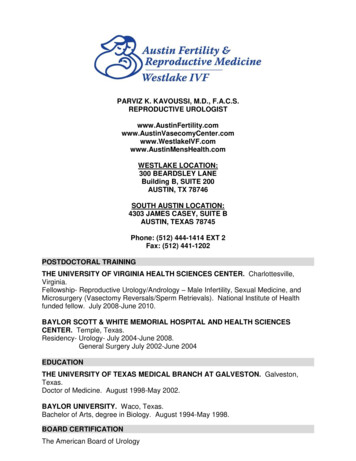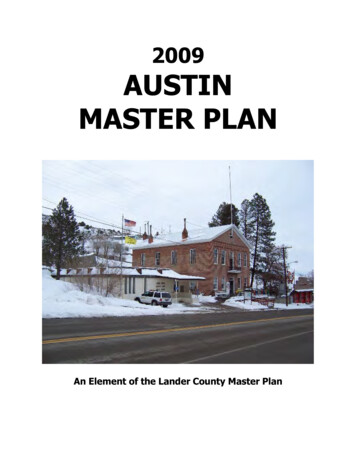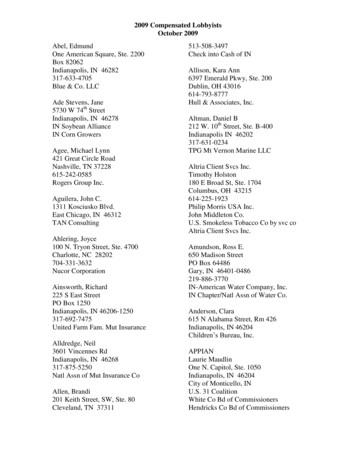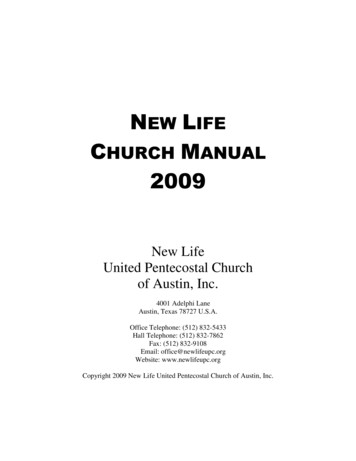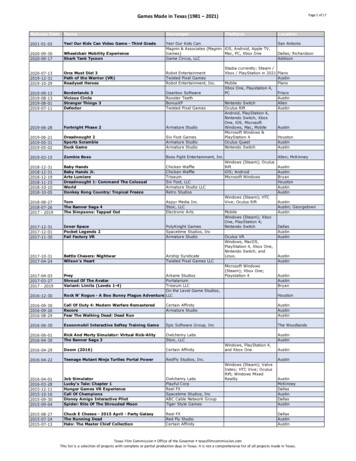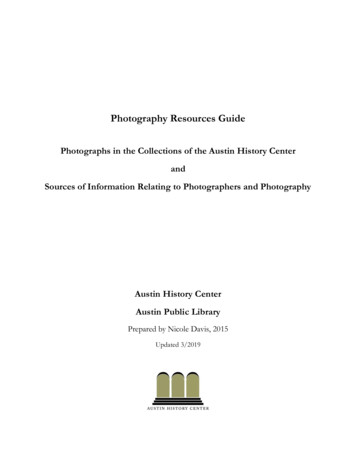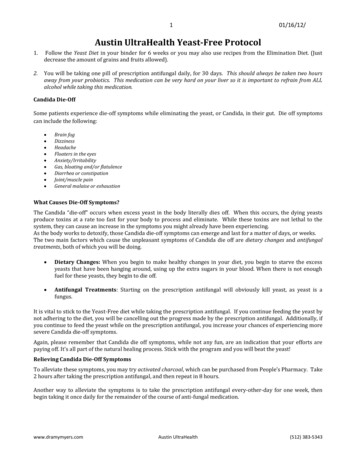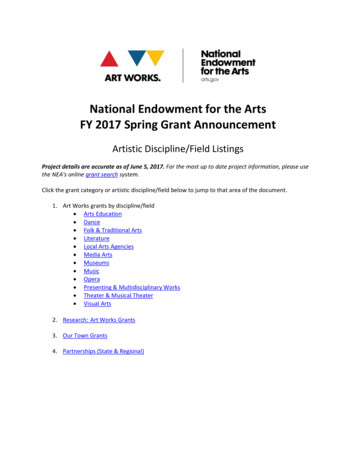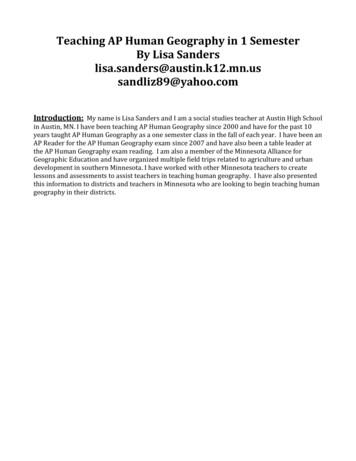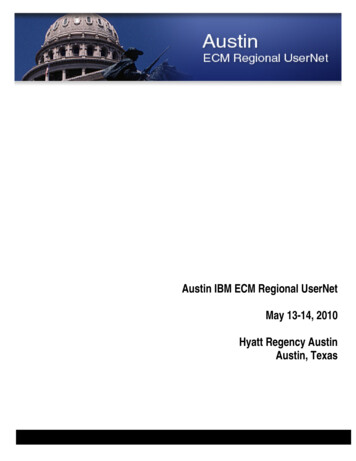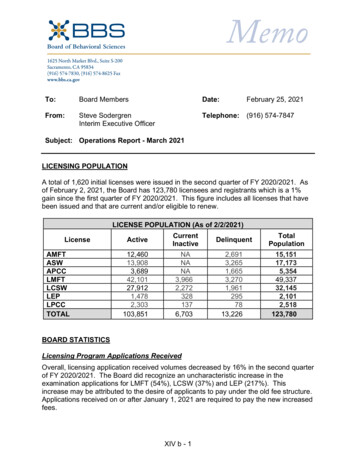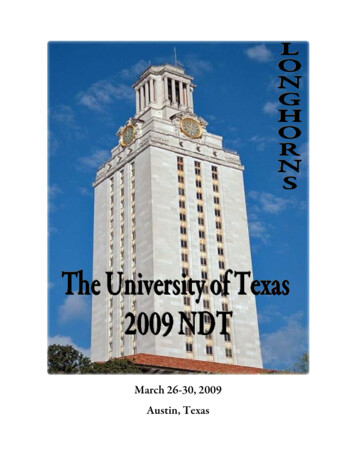
Transcription
March 26-30, 2009Austin, Texas
63rd AnnualNational Debate TournamentHosted byThe University of Texas at AustinMarch 26-30, 2009
March 26, 2009Dear National Debate Tournament Participants:On behalf of the students, faculty, staff, and debate champions in the Department ofCommunication Studies at the University of Texas, I welcome you all to the University of Texasat Austin. We are proud to help host the “NDT” and to welcome debaters and coaches tocampus.There is a UT t-shirt that says, in the best tradition of Texas self-satisfaction, “What Starts HereChanges the World.” While that’s true of the world class teaching and research conducted atAustin, I also think it’s true of what will happen as this tournament kicks off. As a formerdebater and coach, I know that involvement in debate changes those who compete. Debate is anactivity that empowers people to emerge into the world as articulate, creative, and engagingchange agents. So whether you win a trophy or not during this tournament, what you start isgoing to change your world and the worlds of those around you.I want to thank our wonderful tournament host and Debate Coach, Dr. Joel Rollins, who hasbeen ably assisted this year by, Sean Tiffee, Tiara Naputi, Kirk Evans, J. V. Reed, and ChrisThiele. Our office staff of Jennifer Betancourt, Deanna Matthews, and Margaret Surratt hasoffered crucial and invaluable help in organizing the tournament. Too many undergraduate andgraduate students to name have given of their time and talents. The Debate program here ishoused in our Department, but really it is a University of Texas prize possession, and so creditmust go to all those around the university who have contributed to this great event.Good luck and good speaking!Sincerely,Barry BrummettCharles Sapp Centennial Professor in CommunicationDepartment of Communication Studies Chair
March 18, 2009On behalf of Palisades Associates, we welcome you to the 63rd NDT and wish you an enjoyable andsuccessful tournament. We believe that the value of participation in policy debate has never been higher.A number of new administration officials have policy debate backgrounds and we expect to see theirdebate experience influence public policy decision making. A recent magazine profile of Larry Summers,for example, devotes considerable coverage to his college debate career. We’ve often found it interestingto review past topics and see how debate cases have ultimately become actual policies. NDT debatelikely played a key role in making that happen, by exposing future policy makers to issues, tested bycompetition, that otherwise might only receive attention in relatively obscure academic writings.Further, the success of Urban Debate Leagues has been aided by the support of many officials who nowhold influential positions in the federal government and we anticipate the continued spread of debating ininner city schools to be an important component of national education policy.Though the impact of NDT debate can be seen on the national policy stage, we cannot overlook theimmense value to the debaters of participation in intercollegiate policy debate. The skills developed,hours of hard work devoted and tough competition endured by NDT participants will forever be a part ofeach of you. Regardless of your record at this NDT, you will always be able to say that you participatedin college debate’s national championship competition.As we reflect on the year since the last NDT, we note with sadness the passing of dedicated debateprofessionals, some of whom were our contemporaries in policy debate. Joe Jackson, Scott Nobles, MikePfau, Jim Unger and John Wallen will be missed, but we take solace in knowing that part of each of themlives on in the students they taught and the activity they loved.With the assistance of Tom Rollins, we’ve gathered the contributions of many former NDT debaters toendow a new honor, in memory of Jim Unger, which will be given to the coach of the Copeland Awardwinner for the first time at this NDT. We are also pleased to announce that we have agreed with the NDTBoard of Trustees to continue our support of this tournament for another five years, through 2015.Congratulations and good luck.Greg A. RosenbaumCharles E. Garvin
TENTATIVE TOURNAMENT SCHEDULE2009 National Debate TournamentThursday, March 269:00-11:00Registration (DoubleTree Hotel, Robertson Room)12:30-2:30NDT Board of Trustees Meeting (DoubleTree Hotel, Robertson Room)1:00-4:00NDT Committee Meeting (DoubleTree Hotel, DeZavala Room)4:00-5:00Late Registration (DoubleTree Hotel, Robertson Room)8:00Light Buffet Reception and Pre-Tournament Awards, Sponsored by District III(DoubleTree Hotel, Phoenix Ballrooms Central & North)Keynote Speaker, Jim HightowerFriday, March 277:30Continental Breakfast, sponsored by Bracewell & Giuliani LLP(DoubleTree Hotel, Phoenix Ballrooms Central & North)8:00Announcement of Round I (Phoenix Ballrooms Central & North)12:15Start Time of Round II2:00Lunch (DoubleTree Hotel, Phoenix Ballrooms Central & North)3:45Announcement of Round III (Phoenix Ballrooms Central & North)Saturday, March 28 – Tournament moves to UT Campus8:0011:3012:305:15Announcement of Round IV (Texas Union Ballroom)UT Law Luncheon and Panel (Texas Union Ballroom)Debate Skills in the Law Profession – UT Law School PanelDerek Jinks, The Marrs McLean Professor in LawFrank Cross, Herbert D. Kelleher Centennial Professor of Business LawRuss Falconer, Third Year UT Law StudentJ.T. Kittrell, First Year UT Law StudentAnnouncement of Round V (Texas Union Ballroom)Announcement of Round VI (Texas Union Ballroom)Sunday, March 298:00Announcement of Round VII (Texas Union Ballroom)11:15Lunch (Texas Union Ballroom)12:45Announcement of Round VIII (Texas Union Ballroom)5:00Announcement of First Elimination Round (Texas Union Ballroom)Tournament returns to the DoubleTree Hotel9:45Awards Banquet (DoubleTree Hotel, Phoenix Ballroom)Monday, March 30 – Tournament continues at the DoubleTree Hotel7:15Drawing of Octofinal Judges (Phoenix Ballrooms Central & North)7:30Announcement of Octofinals (Phoenix Ballrooms Central & North)8:30Octafinal Round Begins(Rounds continue throughout the day)
HISTORY OF THE NATIONAL DEBATE TOURNAMENTThe National Debate Tournament began at the United States Military Academy in 1947. It wasorganized and conducted by the academy at West Point for its first twenty years. Initialtournament rules were determined by the West Point Administration in consultation with suchdebate coaches as A. Craig Baird of the University of Iowa, G. M. Musgrave of Des Moines,Alan Nichols of USC, E. R. Nichols of the University of Redlands, and Joseph O'Brien ofPennsylvania State University.At the first tournament in 1947, twenty-nine colleges participated in five "seeding" rounds andfour elimination rounds over a three day period. Some of the features of the tournament were thatno school would meet a school within five hundred miles of itself during the seeding rounds andthat no coach would judge a school from his or her own district. Many traditions were started atWest Point that year, some of which still remain today: the "big board", oral announcement ofround pairings, cadet escorts for each team, teams for each debate meeting under the banner ofthe affirmative team, and team signs in the rooms.In 1967, the National Debate Tournament entered a new era as the American ForensicAssociation, the national professional organization of forensics educators, assumed responsibilityfor the tournament. The NDT was moved from West Point and has been hosted by a differentschool every year since, although three schools (State University of West Georgia, MiamiUniversity of Ohio, the University of Utah) have hosted it twice. Control of the tournamentbecame the responsibility of a national committee elected by those schools supporting thetournament.As debate has developed in recent years other refinements have been added to the tournament:the ten-minute preparation time rule, elaborate procedures for assigning judges, judgequalifications and published critiques of the final debate. Over the years, the tournament hasexpanded in size, with various procedures used for selecting the participants. I n the early days,teams were chosen by district nominating committees. This method was replaced by some formof qualifying tournaments in most districts. For the first twenty years of NDT competition thetournament host and previous year's winner received automatic invitations. Post-district at-largebids were initiated in 1968 and pre-district bids in 1971. Since 1970, it has been possible for aschool to qualify as many as two teams for the NDT. This year seventy-four teams participatedin the NDT. Beginning in 1992, up to six schools can qualify a third team.The National Debate Tournament is sponsored by the American Forensic Association. The NDTis also indebted to Mr. Sigurd S. Larmon (1891-1987) for donating the rotating Larmon Trophy,emblematic of the national debate championship; to Mr. and Mrs. George Walker for donatingthe rotating second-place Walker Memorial Trophy in memory of their son; to Mr. RobertFeldhake, top speaker in the 1976 NDT and now an attorney in Los Angeles for donating theWayne Brockriede Top Speaker Award; to District IX for donating the rotating Top SpeakerTrophy; the Copeland Family for donating the Rex Copeland First Team At Large Trophy, toOvid R. Davis for donating the Ovid R. Davis/West Georgia College Championship CoachAward and to Lucy Keele for the funding to support the Lucy Keele Service award.
JIM HIGHTOWER2009 National Debate TournamentKeynote SpeakerNational radio commentator, writer, public speaker, andauthor, Swim Against The Current: Even A Dead FishCan Go With The Flow, Jim Hightower has spent threedecades battling the PowersThat Be on behalf of the PowersThat Ought To Be - consumers, working families,environmentalists, small businesses, and just-plain-folks.Twice elected Texas Agriculture Commissioner, Hightowerbelieves that the true political spectrum is not right to left buttop to bottom, and he has become a leading national voice forthe 80 percent of the public who no longer find themselveswithin shouting distance of the Washington and Wall Streetpowers at the top. Hightower is a modern-day JohnnyAppleseed, spreading the message of progressive populism allacross the American grassroots. He broadcasts daily radiocommentaries that are carried in more than 150 commercial andpublic stations, on the web, on Armed Forces Radio, and onRadio for Peace International. He also does a weekly video blogthat is carried on many popular websites.Each month, he publishes a populist political newsletter, "TheHightower Lowdown," which now has more than 135,000subscribers and is the fastest growing political publication in America. The hardhitting Lowdown has received boththe Alternative Press Award and the Independent Press Association Award for best national newsletter.A popular public speaker who is fiery and funny, he is a populist road warrior who delivers more than 100speeches a year to all kinds of groups.He is a New York Times best-selling author, and has written seven books including, Thieves In High Places:They've Stolen Our Country And It's Time To Take It Back; If the Gods Had Meant Us To Vote They Would HaveGiven Us Candidates; and There's Nothing In the Middle Of the Road But Yellow Stripes and Dead Armadillos.His newspaper column is distributed nationally by Creators SyndicateHightower frequently appears on television and radio programs, bringing a hard-hitting populist viewpoint thatrarely gets into the mass media. In addition, he works closely with the alternative media, and in all of his workhe keeps his ever-ready Texas humor up front, practicing the credo of an old Yugoslavian proverb: "You canfight the gods and still have fun."Hightower was raised in Denison, Texas, in a family of small business people, tenant farmers, and workingfolks. A graduate of the University of North Texas, he worked in Washington as legislative aide to Sen. RalphYarborough of Texas; he then co-founded the Agribusiness Accountability Project, a public interest project thatfocused on corporate power in the food economy; and he was national coordinator of the 1976 "Fred Harris forPresident" campaign. Hightower then returned to his home state, where he became editor of the feistybiweekly, The Texas Observer. He served as director of the Texas Consumer Association before running forstatewide office and being elected to two terms as Texas Agriculture Commissioner (1983-1991).During the 90's, Hightower became known as "America's most popular populist," developing his radiocommentaries, hosting two radio talk shows, writing books, launching his newsletter, giving fiery speechescoast to coast, and otherwise speaking out for the American majority that's being locked out economically andpolitically by the elites. As political columnist Molly Ivins said, "If Will Rogers and Mother Jones had a baby, JimHightower would be that rambunctious child -- mad as hell, with a sense of humor."
REMEMBERINGDR. MICHAEL PFAUMarch 14, 1945 - March 12, 2009Michael Pfau’s life and career expressed his passion for research, argumentationand teaching. After graduating from Bloomington HS, he served in the US AirForce, earned his BA and MA from the University of New Hampshire, and laterobtained his PhD from the University of Arizona. His publication record was second to none,achieving a strong reputation in both the persuasion and political communication domains. Hereceived numerous awards for his scholarship over the years and recently served as the editor ofthe Journal of Communication. He also served as the editor of Argumentation & Advocacy from1992-1994. Dr. Pfau impacted the lives of countless students especially those he worked with atAlexander Ramsey HS in Roseville, MN (1971-1975); Augustana College in Sioux Falls, SD(1975-1993); the University of Wisconsin in Madison (1993-2001); the University of Oklahoma,where he served as chair of the institution's Department of Communication (2001-2009); and amultitude of debate institutes and tournaments. Wherever he taught, he channeled his unflaggingenergy to motivate and inspire students to reach their goals.
THE LUCY KEELE AWARDWith age comes growing respect, and appreciation for those individuals who have devoted somuch time and effort into making the forensic community a more enjoyable and productiveexperience for so many students. The first annual award for forensic contributors was initiated bythe NDT Board of Trustees in 1996. The 50th NDT at Wake Forest was a festive event withmany NDT alumni returning to see how the activity, that had so influenced their lives, hadevolved. The Lucy Keel Award in honor of the former Director of Debate at CSU Fullerton andmember of the Board of Trustees for many years, was created to recognize outstanding service tothe Debate Community, the previous recipients have been:1996 Donn Parson, University of Kansas1997 Brett O'Donnell, Liberty University1998 Melissa Wade & Bill Newnam, Emory University1999 George Ziegelmueller, Wayne State University2000 Bill Balthrop, University of North Carolina2001 Rich Edwards, Baylor University2002 Pat Ganer, Cypress College2003 Frank Harrison, Trinity University2004 Will Baker, New York University2005 Allan Louden, Wake Forest University2006 David Zarefsky, Northwestern University2007 - Stephan Bauschard, Lakeland Schools, NY2008 - Bill Southworth, University of Redlands
THE GEORGE ZIEGELMUELLER AWARDA second award was initiated at the 1999 NDT. Wayne State Alumni endowed an award inhonor of their coach, George Ziegelmueller, for his over 30 years of excellent coaching, timelesscommitment to the activity and numerous contributions to the forensics community---not theleast of which was saving the NDT in 1966. Appropriately enough it is called The GeorgeZiegelmueller Award and is presented to a faculty member who has distinguished himself orherself in the communication profession while coaching teams to competitive success at theNDT. Justifiably, George was himself the first recipient, others who have followed include:1999George Ziegelmueller, Wayne State University2000Allan Louden, Wake Forest University2001Chester Gibson, State University of West Georgia; Ken Strange, Dartmouth College2002Herb James, Dartmouth College; Karla Leeper, Baylor University2003Donn Parson, University of Kansas; Tuna Snider, University of Vermont2004Cate Palczewski, University of Northern Iowa2005William Southworth, University of Redlands2006Scott Harris, University of Kansas2007Scott Deatherage, Northwestern University2008Sarah T. Partlow Lefevre, Idaho State University
THE REX COPELAND AWARDOn September 21, 1989 the life of RexCopeland was brought to a sudden and tragic close.With its end Samford University lost an outstandingstudent, the forensic community lost an excellentdebater and his many friends were deprived of thefriendship and love of a fine individual person. Rexinitiated his commitment to competitive debateduring his years at Huffman High School inBirmingham. Each year saw ever greater growth,success and recognition. Indeed, by the conclusion ofhis junior collegiate season at Samford (1988-1989)there was no question that he had established himselfas one of the finest debaters in the entire country. Nodoubt his senior year would have witnessed adistinguished culmination to an outstanding career.Many of us knew how much he eagerly anticipated it.Word of his tragic death first reached manyof the forensic community at the Northern IowaUniversity Tournament. That event, and many otherssubsequently conducted, were all marked by a senseof acute professional, and even greater personal, loss.For Rex was seen a respected foe and valued friendby many students and coaches alike on "the circuit."It is in recognition of those rare professionaland personal qualities which Rex offered thatSamford University together with his parentsdetermined to endow a permanent award in his name.Therefore, with the agreement of the NDT Board ofTrustees and the NDT National Committee, the RexCopeland Memorial Award will be presentedannually to the collegiate debate team ranked"Number One" in the First Round, At-Large teamselections. A perpetual plaque will also beestablished and engraved with the names of all pastrecipients."Rex's legacy is his joy of life, his goodnature and warm personality make us foreverremember him. Family and friends brought himhappiness. Debate competition brought him honoramong his peers. "Few will have known Rex in a fewyears except through this Memorial Award. To thoselucky enough to remember him, his love of lifeshould be what we think of when his name ismentioned. To those who never knew him, know thathis happiness came not from single-minded pursuits,but from a balance of hard work and play. Life is tooshort to forget those people and events that trulymake a difference."The glory of humankind is to be wellremembered. This award is for the few who achieveone of the highest honors in the debate community,so that they too will be well remembered."20081st - University of California - Berkeley - Michael Burshteyn & Jacob Polin2nd - Emory University - Julie Hoehn & Stephen Weil3rd - Harvard University - Eli Anders & Jason Murray4th - Dartmouth College - Josh Kernoff & Hade Olsen5th - University of Kansas - Brett Bricker & Andrew Jennings20071st - University of Georgia -Brent Culpepper & Kevin Rabinowitz2nd - University of Oklahoma - Conor Cleary & Blake Johnson3rd - University of Kansas - Brett Bricker & Andrew Jennings4th - Dartmouth College - Karthryn Clark & Kade Olsen5th - Wayne State University - Gabe Murillo & Andy Timmons20061st - Harvard University - Michael Klinger & Nikhil Mirchandani2nd - Cal Berkeley - Michael Burshteyn & Craig Wickersham3rd - Michigan State - Ryan Burke & Casey Harrigan4th - Northwestern - Noah Chestnut & Josh Branson5th - Dartmouth - Kathryn Clark & Brian Smith
20051st Northwestern University - Tristen Morales & Josh Branson2nd Harvard University - Michael Klinger & Elliott Tarloff3rd University of California, Berkeley - Stacey Nathan & Craig Wickersham4th Michigan State University - Aaron Hardy & Shaun Vanhorn5th University of California, Berkeley - Gaurav Reddy & Reid Shannon)20041st University of California, Berkeley - Dan Shalmon & Tejinder Singh2nd - Michigan State - Greta Stahl & David Strauss3rd - Emory University -Casey Wolmer & Scott Phillips4th - Harvard University - Michael Klinger & Elliot Tarloff5th - University of Georgia - Naveen Ramachandrappa & H. Watson20031st Northwestern University - Geoff Garen & Tristen Morales2nd - Emory University - Josh Lynn & Scott Phillips3rd - University of California, Berkeley - Stacy Nathan & Dan Shalmon4th - Michigan State Greta Stahl & David Strauss5th - Whitman College Thad Blank & Charles Olney20021st Dartmouth College - Alex Berger & Ben Thorpe2nd Northwestern University - Jacob Foster & Jonathan Paul3rd Michigan State University - Austin Carson & Calum Matheson4th University of California, Berkeley - Stacy Nathan & Dan Shalmon5th Whitman University - Thad Blank & Charles Olney20011st University of California at Berkeley - Randy Luskey & Dan Shalmon2nd Wake Forest University - Wesley Lotz & Jarrod Atchison3rd University of Iowa - Andy Ryan and Andy Peterson4th Dartmouth College - Alex Burger & Adam Garen5th Emory University - Kamal Ghali & Stephen Bailey2000 - Beginning in 2000 the top five teams were recognized1st University of Iowa - Kristen Langwell & Andy Ryan2nd Emory University - Kamal Ghali & Stephen Bailey3rd Emory University - Larry Heftman & Jeff McNabb4th Michigan State University - Steve Donald & Aaron Monick5th University of Kansas - Mike Eber & Grant McKeehan1999 - Northwestern University - Michael Gottlieb & Ryan Sparacino1998 - Emory University - George Kouros and Anjan Sahni1997 - University of Michigan - Scott Hessell and Corey Stoughton1996 - Northwestern University - Sean McCaffity and Mason Miller1995 - Wake Forest University - John Hughes & Adrienne Brovero1994- University of Kentucky - Paul Skiermont & Jason Patil1993 - Dartmouth College Ara Lovitt & Steven Sklaver1992 - Dartmouth College - Kenny Agran & Ara Lovette1991 - University of Redlands - Roger Cole and Marc Rubenstein1990 - Harvard University - David Coale & Alex Lennon
THE UNGER AWARDJames John Unger was a highly successfuldebate coach at Georgetown andAmerican universities, served as pastdirector of the National Forensics Institute,and was an innovative argument theorist. Mr.Unger was a national champion debater atBoston College, from which he graduated in1964, and coached debaters while at HarvardLaw School, where he received a degree in1967. The next year, he became Georgetown'scoach. His teams were ranked first in thenational coaches' poll five times.In a 1970s poll of leading intercollegiatecoaches and debaters, he was namedOutstanding Debate Coach and OutstandingDebate Judge of the decade. "He had a steeltrap mind, and he taught you strategies that guaranteed steel-trap success," said ThomasM. Rollins, a lawyer and former Georgetown debater who was a two-time NationalDebate Tournament Top Speaker.Instantly recognizable on the Georgetown campus thanks to his usual three-piece suit,bow tie and walking cane, Mr. Unger was, in Rollins's words, "relentless in pushing anargument and in testing any position that you took."In the late 1970s, Mr. Unger's "policymaking" approach to debate strategy becamestandard practice for debate teams at the high school and college levels. In 1985, Mr.Unger became director of forensics at American. He led its National Forensics Institutesummer program, which brought thousands of high school students to Washington tostudy competitive speech. He retired from AU in 1996.In a 1992 debate, he gave high marks to the studio audience. "The people are thewinners," he said. "The quality of the ordinary folks asking relevant questions is superiorto the politicians trying to answer them."This year marks the inception of a new honor, in memory of Jim Unger, which will begiven to the coach of the Copeland Award winner for the first time at the 2009 NationalDebate Tournament.
THE NATIONAL COACH OF THE YEAR AWARD1967 Anabel HaygoodUniversity of Alabama1968 Herb James Dartmouth College1969 George Ziegelmueller Wayne State University1970 John Lynch St. Anselm's College1971 James Unger Georgetown University1972 David Zarefsky Northwestern University1973 Thomas Kane University of Pittsburgh1974 Daniel Bozik Augustana College1975 Chester Gibson West Georgia College1976 Bill Henderson Houston University1977 Cully Clark University of Alabama1978 No award protesting SCA moving onto the weekend1979 Tim Browning University of Arizona1980 Donn Parson University of Kansas1981 J. W. Patterson University of Kentucky1982 Ken Strange Dartmouth College1983 Tim Hynes University of Louisville1984 Walter Ulrich Vanderbilt University1985 Bill Balthrop University of North Carolina1986 Robin Rowland & David Hingstman Baylor University1987 Jeff Bile Southern Illinois University1988 Allan Louden Wake Forest University
1989 Daryl Scott Gonzaga University1990 Dallas Perkins Harvard University1991 Melissa Wade Emory University1992 Glen Strickland Emporia State University1993 A. C. Snider University of Vermont1994 David Berube University of South Carolina1995 Todd Graham Northwestern State University1996 Doug Duke University of Central Oklahoma1997 Ross Smith Wake Forest University1998 William E. Newnam Emory University1999 Carrie Crenshaw Univerity of Alabama2000 Will Repko Michigan State University2001 Joel Rollins University of Texas-Austin2002 Scott Deatherage Northwestern University2003 Jim Hanson Whitman College2004 Jon Brushke California State Univ.-Fullerton2005 Sherry Hall Harvard University2006 Scott Harris University of Kansas2007 Ed Panetta University of Georgia2008 Eric Morris Missouri State University
NATIONAL DEBATE TOURNAMENT: FINAL FOUR 1947-20081947 1st - Southeastern State College - W. Scott Nobles and Gerald Sanders, Coach: T.A. Houston2nd - University of Southern California - Potter Kerfott and George Grover, Coach: Alan Nichols3rd - United State Military Academy - John Lowrey and George Dell3rd - Notre Dame - Frank Finn and Tim Kelley1948 1st - North Texas State College - Keith Parks and David Cotton - Coach: S.B. McAlister2nd -University of Florida - Alan Weston and Gerald Gordon - Coach: Wayne Eubank3rd - Purdue University3rd - University of Kansas - Ed Stollenwerck and Kenneth Beasley1949 1st - University of Alabama - Oscar Newton and Mitchell Latoff, Coach: Annabel D. Hagood2nd - Baylor University - Thomas Webb and Joseph Allbritton, Coach: Glenn Capp3rd - Ottawa University - LaVerne Buffum and Robert Logan, Coach: Lloyd Stafford3rd - University of Vermont - Tom Hayes and John B. Harrington, Coach: Robert B. Huber1950 1st - University of Vermont - Richard O'Connell and Thomas Hayes - Coach: Robert B. Huber2nd - Augustana College - Dorothy Koch and Charles Lindberg - Coach: Martin Holcomb3rd - University of Florida - Jack Pesco and Walter Applebaum - Coach: D.C. Barnland3rd - United States Military Academy - Walter McSherry and Robert Gard - Coach: Chester Johnson1951 1st - University of Redlands - James Wilson and Holt Spicer - Coach: E.R. Nichols2nd - Kansas State Teachers College - Robert Howard and Robert Kaiser - Coach: Charles Masten3rd - De Pauw University - Payne and Arvedson3rd - Baylor University - Ted Clevenger and Calvin Cannon - Coach: Glenn Capp1952 1st - University of Redlands - James Q. Wilson and Holt Spicer - Coach: E.R. Nichols2nd - Baylor University - John Claypool and Calvin Cannon - Coach: Glenn Capp3rd - University of New Mexico - Brock & Woodman3rd - United States Military Academy1953 1st - University of Miami - Gerald Kogan and Lawrence Perlmutter - Coach: Donald Sprague2nd - College of the Holy Cross - Michael McNulty and John O'Connor - Coach: Henry J. Murphy, S.J.3rd - University of Alabama - Louis B. Lusk and Murray C. Havens - Coach: Annabel D. Hagood3rd - University of Vermont - H. Robert Spero and Kevin E. Kearney - Coach: Charles Helgesen1954 1st - University of Kansas - William Amold and Hubert Bell - Coach: Kim Giffin2nd - University of Florida - Robert Shevin and Larry Sands - Coach: Douglas Ehninger3rd - Central State Oklahoma - Bill Henderson and Derrill Pearce - Coach: Joe C. Jackson3rd - San Diego State - Lewis V. Accord and Joel J. Snyder - Coach: John W. Ackley1955 1st - University of Alabama - Dennis Holt and Elis Storey - Coach: Annabel D. Hagood2nd - Wilkes College - Harold Flannery and James Neveras - Coach: Arthur Kruger3rd - Wake Forest College - Joe Hough & Carwile LeRoy - Coach: Franklin R. Shirley3rd - Northwestern University - Max Nathan and Jerry Borden- Coach: Joe Laine1956 1st - United States Military Academy - George Walker and James Murphy - Coach: Abbott Greenleaf2nd - Saint Joseph's College - John Gough and J. Foley - Coach: Joseph Erhart, S.J.3rd - Greenville College (OH) - Gary Cronkhite and Robert Werner - Coach: J. William Hunt3rd - Augustana College - David Flemming and Phillip Hubbart - Coach: Martin Holcomb
1957 1st - Augustana College - Norman Lefstein and Phillip Hubbart - Coach: Martin Holcomb2nd - United States Military Academy - James Murphy and George Walker - Coach: Abbott Greenleaf3rd - University of Pittsburgh - Samuel J. Reich and - Richard M. Cromie - Coach: Robert Newman3rd - Fordham University - Charles H. Connolly and Michael Lanzarone - Coach: Rev. F.V. Courneen,S.J.1958 1st - Northwestern University - William Welsh and Richard Kirshberg - Coach: Russell R. Windes2nd - Harvard University - David Bynum and James Kincaid - Coach: Robert O'Neill3rd - University of Southern California - Mike Miller and Paul Sonnenberg - Coach: James H. McBath3rd - P
The University of Texas at Austin . March 26-30, 2009 . March 26, 2009 . . Dr. Joel Rollins, who has been ably assisted this year by, Sean Tiffee, Tiara Naputi, Kirk Evans, J. V. Reed, and Chris Thiele. Our office staff of Jennifer Betancourt, Deanna Matthews, and Margaret Surratt has . and has written se
